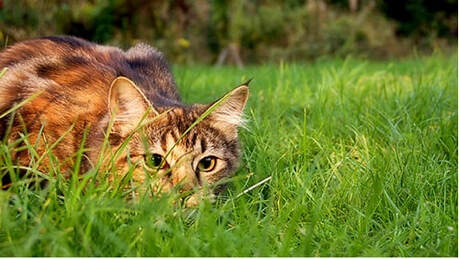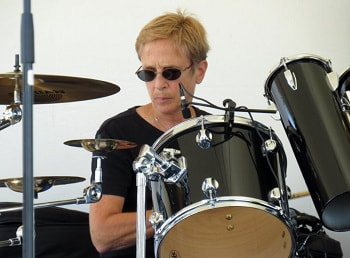 It's insidious, creeps up on you, a bit like a cat in the grass, stalking, ready to pounce when you least expect it. It's this feeling of uncertainty, generated by our old unwelcome adversary COVID, not knowing what tomorrow may bring when this grumpy thing decides to kick up rough again and throw us all into a lockdown of anxiety and financial stress. You don't always realise how anxious you are until you see a news report that startles you like a deer in the forest, makes you uneasy like walking into cobwebs in a dark and unfamiliar old house, feeling your way, or just downright strikes fear like a stake into your heart. And it's exhausting, this constant apprehension about everything. I suppose the reassuring thing here is: you're not the only one. We're all in the same boat, steady as she goes amidst the troubled waters. I've started remembering things in my past, memories of good times, because they are certain. They are mine, my history, and there they are, rock solid, steady and sure. They often appear as little video clips parading across my mind's eye, or as still snapshots of places, people, animals. I remember the first time I played drums in public at the Dairy Flat Community Hall jam night. It was the first time I had ever played outside of my own living room, and I played with some experienced musicians and we played 'Mary Had a Little Lamb', the Stevie Ray Vaughn version. I didn't know the 'stops', as I call them, where everybody is supposed to stop playing for effect and the intro to this song has a couple of those. Of course I played through the stops, my very inadvertent and embarrassing first drum solos. That was a lesson learned and now when I play I ask, 'Are there any stops?' I can also become happy and relaxed for a while when I think about other drumming experiences. Playing music always makes me feel good and I've played in some interesting places: on top of a pool table down Franklin way at a mini country music festival, and in a converted shearing shed up at a farm on the Port Albert Road. I've played at music festivals and most recently at the Paihia Country Rock Festival this month. The photo above was taken at the Orewa Street Fiesta back in February this year. So we do what we can to ease our minds during these 'times of scary' as my neighbour calls them. I often think writing one's thoughts and feelings out in a journal can help too but sometimes even that gets me too wired up and anxious. I never thought I'd feel that way about my journal but sometimes I have to put the pen down, step away and pick up the drumsticks instead. Yeah, man. By the way, below is the Stevie Ray Vaughn YouTube video. I'm not playing in this one.
2 Comments
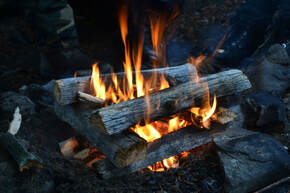 We are hard-wired to tell stories. ... those long dark nights when we sat around the warmth and safety of a fire and shared stories about our day: what we did, what we hunted and gathered, what we saw - and of course all of those tales would've had a good dose of imagination thrown in. That animal we speared for dinner became far larger than it actually was, the trip to gather water from a nearby stream became fraught with tension because we lost our way and couldn't get back for ages (when actually we probably just took some time out to sit by the water and dream for a bit), and then there are the stories we tell about others, embellishing our own with those day to day interactions and relationships. What wonderful stories we had the privilege of sharing at my recent Introduction to Memoir Workshop last weekend. A gathering of women with ideas and projects to describe, eager to commit their stories to the written word. The writing of memoir involves the telling of truth, your story or journey, what happened during a time of change or transformation in your life. It can take courage to tell those stories, and we tell them when we are ready. That can take a while. My Mom died in 2010 and it has only been within the last two or three years that I have started the writing of my memoir about her. In contrast, my memoir about my first year after a breast cancer diagnosis was written and published within three years of that fateful day when I found out I had cancer. Good strong stories customarily follow a narrative arc. A very simplistic description of the arc is the beginning where we meet the main characters and the scene is set (Act 1), the conflict/action/crisis follows (Act 2) and then the resolution ends the story (Act 3), where we find out what eventuated, the conclusion of our story. For example, earlier I mentioned going to the stream for water. That is Act 1 where we meet the person, the scene is set. Act 2 is all the conflict - what happens to challenge the mission of getting water? Our character falls down a hole, or is confronted by a wild animal, or indeed falls in the stream and floats away. Act 3 is how our character made it back to camp. How did they manage? What did they do? What have they learned from the experience? Sometimes we are still living the story we want to write about. There is no resolution yet. We don't know what the end will be. Should that stop you from writing your story? No, I don't think so. You'll probably have the first two parts of your arc, and some memoirs do end with nothing being resolved. Whatever your story and wherever you are in it, tell it. Write it honestly and truthfully, because therein lies the power. 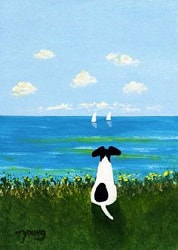 Don't let the boat sail without you! Join me for my Introduction to Memoir Workshop on Sunday 18 April. Find out more ... It's so easy to say, 'I won't think about that today - I'll think about that tomorrow'. That's what Scarlett O'Hara said after shooting a Union soldier dead in the foyer of Tara. She decided to sort that one out later. We do that with our writing. We always think we have another day, another month in which to begin, or we'll plan to write our memoir next year because we'll have more to write about ... oh yes and a nice new laptop on which to write it, and maybe a flash office with a comfy chair and a beer fridge in the corner with a potted African violet on top for a bit of colour. Before we know it, that ship has sailed and we're left on the grass, watching the opportunity vanish into the distance of life. If you've ever wanted to start some writing, or a memoir, now is the time. Procrastination is no longer an option. We may not have that seemingly endless spool of time that will keep unravelling before us, day after day, month upon month, year after year. Maybe you need some help to get started. Nothing wrong with that and getting going can often be the first hurdle we have to jump over. And we do throw up a lot of those. It's kind of like a self-destruct mechanism, a default position almost, thinking up barriers to stop ourselves from beginning. Common ones are: I don't have time, or I have nothing to write about because my life has been so boring (remember, there can be a lot of interest and depth in boring!), I have nowhere to write, I need new glasses etc etc. Others may be 'I don't want to hurt someone by writing my truth about them' or 'What will people think of me when they read what really happened?' These can be emotionally difficult to get through, but there are ways through. You just need to begin the writing. Join me for my Introduction to Memoir workshop on Sunday 18 April and we will get you started on your story. We'll talk about those hurdles and find ways over. We'll get you on board that boat before it sails away. 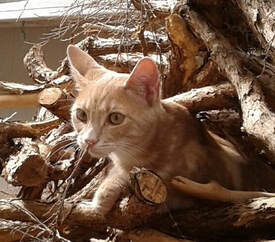 I have a covered porch on the side of my house where I stack firewood to dry over the summer, ready for burning during the cold winter days. At the moment, there's a pile of kanuka from a tree we removed a while back. It's the perfect spot for my colony of wee lizards who enjoy the heat and sunbathe atop the limbs. I was sitting out there the other day when I heard some commotion from within the woodpile. I thought, 'That's a mighty big lizard' and I prepared myself for something out of a horror movie, taking on a defensive stance. Out popped a little ginger head and it was my old mate Mr. Boy from next door. He and his sister Poppy have now discovered my cottage, trekking up all the outdoor stairs to visit and explore what they see as a new and fascinating place. The unexpected … yesterday was a prime example as northern parts of New Zealand were on high tsunami alert following a swarm of earthquakes, one dangerously close to our East Coast, others to the north east near the Kermadec Islands. We've had months of the 'unexpected' here … the White Island volcanic eruption, COVID-19, and now this, a reminder that New Zealand is vulnerable to tsunamis and we could well generate one of our own, sitting as we do on the Pacific's volcanic 'ring of fire' (which we had described to us at school as 'the fiery girdle of the Pacific'. Very dramatic). My first response to Mr. Boy's rustling about in the woodpile was fear and a stab of anxiety - 'What is happening and what will happen to me?' After gathering the facts, it was, 'What do I do about this?' In this case, nothing apart from enjoying my little friend's company for a few minutes until he dashed off for more adventures in the garden. Yesterday, we had a call to action in the face of a threat and people responded in an orderly, calm way, getting to higher ground to await an 'all clear.' For those of us in Auckland, there was no need to evacuate but everyone in our neighbourhood here kept a weather-eye out, watching the high tide for signs of even higher water and unusual currents. I woke up this morning thinking, 'what could possibly happen today?' So far nothing more than a beautiful, calm, and sunny Saturday morning. Life being what it is, this calm could change in a moment. We live in a time of uncertainty already, never knowing if the COVID-19 balance will tip into the danger zone while we await our vaccinations against it. Add something else into the mix, whether it's Mr. Boy or an earthquake, then we can tip all too easily into our own emotional danger zones. I already feel better writing about it because confessing my anxiety about Mr. Boy leaping out of the woodpile and the tsunami (accompanied by screaming alerts on mobile phones, media coverage on TV that could scare the crap out of anyone, plus the incessant wailing of evacuation sirens in areas where the threat of inundation was very real indeed) to the written word. Seeing my worry laid out in front of me takes some of its power away, helps me to process the feelings and understand my responses. 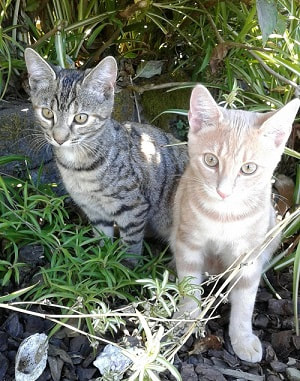 It was Hemingway who said, 'Writing, at its best, is a lonely life'. Writing is something that we will often do alone, but does that mean it is a 'lonely life' or do we just have that need for solitude that makes one perceive that writing is a lonely occupation? I can't say I've ever felt lonely when I'm writing because my head is so full of ideas and characters rattling around in there, chatting away to me in their raw language that I interpret and hone for the page. Time passes without me knowing, I'm engrossed in what I am doing. I look up and it's lunchtime already. Sometimes we do need to share what we're doing with someone else, a collaboration or a mentoring, someone to coach us from the sidelines or dive deep into the fray alongside, to wrestle those ideas into a story, a poem, a song, a film script. I was reminded of this when I was out gardening the other day, alone with my spade and shears, rummaging about amidst a tangle of weedy horror, in despair because the more I weeded, the worse things got. Then I looked up and there were my two wee mates from next door, Poppy and Mr. Boy, appearing silently from behind a clump of hydrangea. I encouraged them to pick up some tools and get stuck in but they just sat and stared at what I was doing. However, their mere presence and intense interest in my horticultural labours spurred me on and soon my garden waste bucket was full and the mission was accomplished. Afterwards, the three of us retired to the deck where we lay in the sun for a while to bask in the glory of our achievements. I've noticed in my work with writers that yes, the writing life can be heavy going at times, because we are essentially on our own and can get bogged down, tangled up, overwhelmed and it can be so helpful to have someone like Poppy and Mr. Boy who show up, hang out with you, encourage and cheer from the sidelines. Such collegial support can help restore faith and get back on track. If you need someone to cheer you on, come and see me. Book in for a one or two hour mentoring session and, who knows, those two precious wee buddies from next door might pop in and join us for a cup of tea.  Well here we are again … Level Three in Auckland with road blocks at the Super City boundaries and people on edge in New Plymouth where potentially infectious people did some travelling and sightseeing. Long lines at the testing centres and a 3-4 hour wait to get through the boundary checkpoints. Our neighbourhood is quiet again this morning as people sleep in, stay home, no morning commute happening. And it's mighty good weather for staying home as it's rainy, muggy, cloudy with more rain to come. Perfect for catching up on those saved movies and stacks of summer reading books from the library. Or doing some writing! Most seem to have met this latest development with a shrug and a sigh as it is something we expected could happen and hoped would not. We have been fortunate though, exceedingly so, being able to enjoy our summer holidays and events while so much of the world is suffering through wave after wave of the ongoing struggle with this lethal COVID-19. Sure thing, it's a bummer being housebound again and it's an anxious time as we wait for more information about this latest community outbreak. There are concerns for our work and incomes, whether we can get out and do the things we need to (for example, the Warrant of Fitness is due on the car), worries about our families and health, and whether we can place our trust 100% in those who are tasked with keeping us safe. It's a set back but there are positives. We're all OK. Our little neighbourhood here is a microcosm of support - we're communicating over the fences and in the street (socially distant), hanging out on our respective front porches and chatting, keeping each other up to date with the latest news and the do-you-need-anything kindnesses. The phone buzzes, it's someone checking in. It fills you with warmth. These few days provide opportunities to take some 'me' time, a bit of 'time out', take a breather, do some writing, get started on that book or poem you've been thinking about. Writing and reading are good distractions when times are tough, so indulge, heartily. Summer is an easy-going time but most of us were already back on the treadmill of work and obligation. Now we've stopped in midstream. OK, so, step out of the current, make your way to the riverbank, take a seat, and watch the water go by for a day or two. 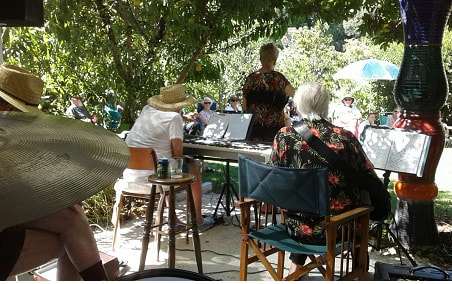 Yes it's summer - long, languid days at the beach and a Summer Writing Salon or two at The Writing Place. What could be better? I took this photo from behind my drum kit at our annual Jazz Concert in John's Garden. This is our third year and the jazz takes place on the Saturday of Anniversary Day weekend here in Auckland. We set up the band under the awning in my neighbour John's back yard, invite all the folks living up and down the street, and have an afternoon of good music and fun. They bring their folding chairs and drinks, find some shade under the trees and settle in to enjoy themselves. This year we had a seven-piece band: drums, keyboard, a saxophonist, a trombonist, a guitarist, bass and vocalist. Fabulous. The music cheered the souls and spirits of everyone who gathered in John's garden. Summer is also the time for writers to get together for a relaxing afternoon of writing and we had a grand old time at the Summer Writing Salon here at The Writing Place in January. Six writers joined me for a good session of writing to timed exercises, sharing the resulting work, discussing and offering good constructive feedback. Some of those attending had projects under way that they presented to the group, asking for ideas, guidance and some inspiration. All in all, it was a wonderful afternoon with an extraordinarily talented group of creative women. Summer is about sharing and enjoying music or writing or any kind of creative activity, settling down in some of our most beautiful places to get inspired, to create, and have fun. Goodness knows we need it after the year 2020 when the world changed so dramatically for everyone. Creativity helps us to 'download', process those feelings of uncertainty that underpin our days as COVID continues to plague us, ease them somewhat so we can relax and our mind can travel a different path, at least for a while. I encourage you to write, play music, share your creations with others. Get out into this beautiful summer. Get inspired. Get writing. Now. 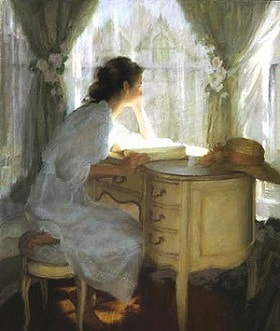 It's coming up to a New Year and American country and western singer Brad Paisley said, "Tomorrow, is the first blank page of a 365 page book. Write a good one." I am hopeful that 2021 will bring more good pages than bad ones. Will you join me at my Summer Writers' Salon on Sunday 17 January 2021 to write your first page? Let's begin our 365-page year book together with a day of writing at the Bay here in Whangaparaoa. Can we call 2020 'bad'? Or simply say, 'It is what it is - a not so good year. We've had them before.' Not like this one, I would reply. I certainly did not factor a global pandemic into my 2020 business plan, no sir, although we did include earthquakes (possible here in Auckland) and a tsunami (also possible). There is no doubt that this year inspired some extraordinary writing as we collectively experienced this COVID-19 virus. Many writers kept blogs, recording their daily thoughts during lockdown periods, expressing their fear, anxiety, sadness, depression - all of those emotions and feelings we have when normal life is off the rails and we don't know what could be coming at us around the next corner. I had never lived through anything like this before. Nothing even close to it. Sometimes it seems that difficult times spawn more. They may be related to the main issue (COVID) or be something else altogether. I am still grieving for my old mate Miss Betsy-cat who died a few weeks ago, thinking I spot a flash of her tabby-brown coat in the sunlight under the lemon tree, or hear her pitter-patter on the roof. There are the orchards in Nelson/Tasman devastated a couple of days ago by horrendous hail, a loss of millions after a year of profound financial loss and struggle. Most people I speak to narrate tales of more loss, grief, challenge, change. But there is brightness too. We're lucky here in New Zealand, able to wander about freely and enjoy a long-awaited summer of sun, relaxation, get togethers with friends and travel within our beautiful country. Tomorrow I am heading up north to visit a friend who has a magnificent property overlooking the blue vastness that is Doubtless Bay. We will talk, laugh, share, and bring in the New Year with good champagne and some neighbours, sitting on her deck overlooking what I hope will be a moonlit sea. I feel humbled by all that has happened this year and I am going forward into 2021 with some care, stepping lightly, not wanting to make even a little wave just yet. I have to feel my way a bit, test the water, see how it goes. That's what I'll be writing on my first page. What will you write about?  But what if you've just been diagnosed with breast cancer? Everyone is decorating their homes, shopping for gifts, buying up large for Christmas dinners and celebrations, and going to end-of-year parties … there's an air of fun, frivolity, and summer plans. You have been given a diagnosis of breast cancer. The impact of a diagnosis changes our perspective during the festive season. Instead of wondering whether to serve roast potatoes, or potato salad with the ham, it’s “How can I celebrate when I have breast cancer?”, “Will I feel well enough to do anything at all with my family?”, and “What is going to happen to me?” … and all the while the cheery emails and cards keep arriving, Great Aunt Maude and mad Uncle Charlie will be there any minute, the helter-skelter build up to The Big Day continues, and you’re left standing on the sideline, exhausted, frightened, panic-stricken, sad, and feeling almost every other emotion it is possible to experience. First off, allow yourself to vent those feelings, thoughts, and emotions. People do at Christmas time, and while yours may not be so jolly, giving yourself permission to express them – laugh, cry, get mad – reflects that old maxim ‘better out than in’. Keep the communication going with those close to you. Acknowledge that this Christmas will be different. You may not be able to keep up some of the traditions, and that’s OK. Christmas is often the time when we feel we must please everyone, make sure our family and friends are cared for, fed well, and enjoy themselves. Mad Uncle Charlie may need to stay with your sister for a bit. Make a plan with family and friends, decide what you feel able to do, and what you aren’t up to doing. Having a plan takes some of the stress away, and also gives you a response when someone suggests what they feel you should be doing. Remember it’s about you and it is your right to choose the best approach that nurtures your well being and healing and does not cause more tension. Accept invitations if you’d like to, and say that you may leave early, or not attend, depending on how you feel on the day. Take time out each day to acknowledge what is happening. All too often over the holiday period there will be an invitation to “swallow it back” and “not rock the boat” for others. All very admirable, but a quiet half hour each day to focus in on your own experience will keep you grounded and sane. Indulge, be kind to yourself, do something that you may not normally do. A diagnosis can make us feel angry – at ourselves, at God, whoever – and we can feel out of control. Self-nurture helps us take things back into our own hands and smooth the way a bit. It is OK to say ‘no thank you’ if you’re not up to it, and ‘yes please’ to offers of help. Sometimes people don’t really know what is needed, so tell them. Perhaps they can assist with some pre-Christmas shopping, or lend a hand with the housework, meal preparation and clean up over the holidays. Christmas and New Year are times to feel grateful for the blessings of family, friends, and many other aspects of life. Feeling gratitude may be tough after a diagnosis, but try to think of three things each day that you are grateful for. These thoughts can provide a small antidote for fear. Even if you are not a religious person, attending a Christmas Eve church service (if you are well enough) can provide a private, quiet space, for you to acknowledge those feelings of grief, loss, fear, uncertainty. Taking time for yourself at home to meditate, or relax, can also offer a peaceful haven and some respite. If you need to talk to someone, Auckland-based Breast Cancer Support has a toll free Help Line available every day throughout the holidays on 0800 273 222. Many of their volunteers have ‘been there too’ at Christmas and can offer practical and emotional support.  Let's say you want to write about your life. Maybe you've traveled to exotic places and had jungle encounters with wild animals ... perhaps you set yourself a personal challenge to swim across Cook's Strait, and on the day it was blowing a gale but you did it anyway, by golly. Did you experience a time of grief and sadness, as a result of a loss, or endure a health crisis that necessitated stays in hospital, lengthy treatment, and a long recovery that changed every aspect of your life? Does your family have a fascinating history, grandparents who fought in world wars, kept diaries as they sailed to New Zealand as immigrants way back when, to forge a new life in what was a wild and untamed place, far from home and all that was familiar? We all have stories to tell, whether they are are own, or we're breathing life into those of our parents or ancestors. Sometimes it's hard to know where to start. There is so much material, an overwhelming multitude of thoughts and memories, like a giant scrapbook with pages all over the show and pictures falling out everywhere, no rhyme or reason to any of it. It's such an avalanche of material, we're lost in it. What to do? Come to a Write-In. I say this because talking about it helps to clarify, distill, break all of that BIG IDEA into manageable pieces. Working in isolation is fine when you've made a start and have a path to follow but when you're struggling with the 'where to start' thing, it can be really helpful to talk to other writers who 'get it' and understand how hard this part of the process can be. I've written before about a writers' group I attended for many years. We've gone our separate ways now but I was so grateful for that supportive presence of other writers, never more so than when I was trying to get started on something. There's a trust that develops amongst a small group, even one that is meeting for the first time, and it doesn't take long for that camaraderie to emerge. That's one of the best things about a Write-In. People arrive, unknown to each other, and leave as colleagues, all sharing that wonderful ability to weave words into gold. And the best part? Coming away with a direction for that story or project, knowing how and where to begin, with energy and enthusiasm, inspiration and motivation. Join us for a Write-In, Saturday 7th or 14th November, or both. I guarantee you'll enjoy it, or I'll eat my Halloween witch's hat. 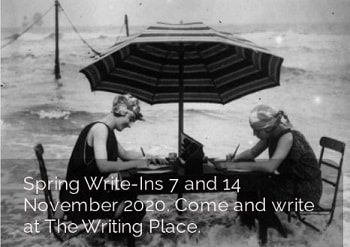 I'm having a Spring write-in, two in fact, the first on Saturday 7 November and the second a week later on the 14th. Find out more! Sorry to say, it's not a love-in (popular back in the 60s with the hippies, an outdoor public gathering and demonstration of love, friendship and unity, often with psychedelic drugs) however it is a chance to get together with other writers, do some writing and share experiences of the writing life. The write-ins are held at my Writing Place here in Arkles Bay, a beautiful bay that a friend of mine recently referred to as 'the jewel in the crown of Whangaparaoa' - and it is indeed a lovely, peaceful place to live and write. I'm not the only writer living in Arkles Bay. There's another writer a few doors down from me, and a few more residing nearby. So what is a write-in at The Writing Place? It's an informal gathering of up to six writers, here at my writing studio, from 10am to around 2pm. First up is coffee or tea and a chat where we introduce ourselves, talk about our writing preferences (and these vary considerably, from genres like fantasy and horror, to children's fiction, memoir, life story and more) and what we'd like to do with the write-in time. Some writers have projects they're working on and just need some quiet hours. Others come to receive guidance and support to make a start. Some attend just to be with other writers and this alone can be a reassuring and confidence-boosting benefit. We usually begin the day's work with some timed writing exercises. I give writers 3 minutes to write on a set topic, or I'll offer up a beginning like, 'Today I feel like ...' and they do the rest. This is a good way to begin as it warms up those writing muscles. All are welcome to read their short writings to the group if they'd like to, and then we're into our work for the day. During this time I offer a 15 minute individual coaching/mentoring session to each writer. They may have a particular problem they wish to chat about and this could be anything from writing process to getting published or overcoming a roadblock. We break for lunch (everyone brings their own and we sit out on the deck with a view of the bay, if the weather is nice) and chat and then we do some more work. Towards the end of the day we'll have another sharing time of readings and feedback. Now, I have to stress to you that the sharing is entirely optional. There is no pressure whatsoever to share work with the others but comments from previous write-ins have indicated that writers feel very comfortable here, confident and safe in this environment and that is great to hear. So won't you join us for a day of writing on either the 7th or the 14th, or both? It's just $35 to come to the write-in and I can guarantee you'll leave feeling relaxed, confident about your writing, and you'll have made some new friends. You may even have made a start on a novel or project, or have come up with something you never thought possible ... good on you!  Let's say each word you write costs you a dollar. Your natural response would most likely be, 'I want to save money.' Inflation might bring this up to $5 in a few years' time. Then you'd be very economical. Now I know that when we're in the heat of creation on that first draft, we're encouraged to get it all out on the page - blah on without restrictions - so we're going to spend a lot of money on those words. And I think that's OK because, if I can get lyrical here, our creativity is richly endowed and can afford it. But when it comes to editing back, honing our story to perfection, each word matters and has to earn that dollar or five dollars to deserve its place in your story. And if you remember that each word is costing you, you will be ambitious about cutting out the ones that don't serve the purpose so you can save 'money'. Let's take an example: here's something I wrote recently as part of the book I'm writing about my Mom. It's definitely first draft stuff. Here goes: Whenever we went to the beach, Mom would always wear her palm frond hat she got in Fiji when we came over on the boat from America. Over time, it got faded and crisp, those fronds were sticking out all over the place and the little bird that used to nestle on the side was long gone, blown away one day with the tidal winds. She also wore a bathing suit with a funny skirt that used to float about her as she waded into the water and along with the hat she looked like some kind of exotic bird. That's 100 words and at, say, one dollar a word, that passage has cost me $100. Way too dear. So now I take to this passage with a financier's eye and cut back to what I can afford, and what my story actually needs to move it along: Mom had a faded palm frond hat she wore to the beach and a bathing suit with a skirt that floated about her like some exotic bird's plumage as she waded into the water. 33 words, $33 dollars, and I've saved $67. The sentence isn't quite to final draft stage but you see what I mean. Does the reader really need to know that the hat came from Fiji, bought while we were on a boat? This information, in fact, is covered earlier in the story, and we don't need to know about the bird that once decorated the hat. What is important is the hat and the bathing suit and the image of Mom as some kind of weird bird. Words can cost us dearly, not in monetary terms, but because too many of them can hold up action. We have to be ruthless when we're editing. Think economy, saving money, working to a budget, making every dollar count. Every word need to be there for a reason. Every word is there to serve the story and move it along because the story is everything. 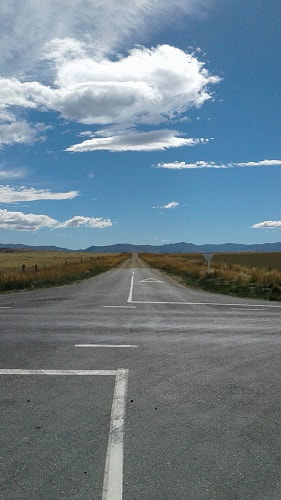 Whenever I visit Central Otago, I always make time to go to the Boundary Road crossroads. Made famous in the painting by Grahame Sydney, 'Boundary Road', this to me is one of the most stunningly beautiful places in Central. True, there are no lakes or rivers around that you can see, and the mountains and hills are distant, but this place intrigues and humbles me. Usually when we go there, the road is quiet. The occasional car goes by, but mostly it is silent, just the crackling of the grasses and trees in summer heat, or crisp cold winter air that you can swallow by the mouthful like clear mountain snow melt in a bustling river. I like to stand right out in the middle of the road, at the heart of the cross. You can hear a car coming miles off so plenty of time to get out of the way. We often find ourselves at a crossroads, not only in life but also in our writing, where we must choose which way to go, not always knowing how that decision is going to turn out but understanding that the road will take us somewhere and the journey will probably be well worth it. One particular dilemma for a writer is: 'Should I begin this project? Which way should I go, how should I begin?' There are choices and decisions to be made at these creative crossroads. Sometimes we'll choose a path that doesn't work out. It's a dead end, a cul de sac where we have to make a u-turn and head back to the intersection, take another road. 'OK, let's try this one and see where it takes us.' As disheartening as choosing the wrong road can be, I always remember a poem I was given very early on when I started writing. It's Ithaka by Greek poet C.P Cavafy and in it, he describes the journey one takes towards a destination. He begins, 'As you set out for Ithaka Hope your road is a long one ...' I think about this poem when I'm at Boundary Road, standing right in the middle of those four, dead straight roads heading off into four different directions. Which shall I choose? Make the decision, take a chance, your choice, your writing destination. Even if it turns out that the destination disappoints you, or is that dead end we dread, you will have taken the journey, seen and learned so much along the way. Choose your Ithaka. 'Ithaka gave you the marvelous journey. Without her you wouldn't have set out.' 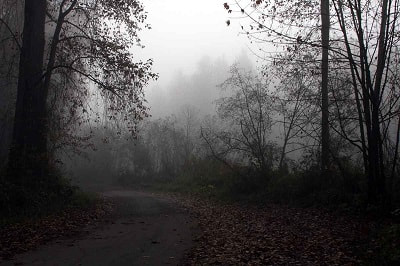 My last post was written when we were facing another major lock down here in Auckland. We had a community outbreak so it was pronto-quick into Level Three while the rest of New Zealand stayed at Level Two. Level Three contained us within the city limits unless there was a rock-solid reason to be let out. Indeed the queues of cars at roadblocks attested to the hundreds of folks trying to leave with special exemptions in hand. Many were turned back. The feeling that we we could not leave Auckland without good reason made for anxious times. Now we are at Level 2.5, in that twilight zone of uncertainty between Levels 2 and 3. The way forward is unclear, the future foggy, the outlook tinged with the grey that reflects flagging spirits, worried brows, financial cliffhangers and the spectre of this ghastly virus that has settled in for the long haul. We can now travel outside of Auckland but I think the rest of the country views us with some trepidation. We have had a community outbreak and while it appears to be under control, every day brings fresh information and none of it is exactly hands-in-the-air-hip-rah. The government isn't doing Aucklanders any favours by saying if we do travel, take our Level 2.5 restrictions with us into the rest of New Zealand's Level Two. They can have gatherings of up to 100 people. We can only have groups of ten and the Minister of Health says, with a smile, Aucklanders should perhaps think twice about attending gatherings of up to 100. Our usual twilight zone 2.5 number of ten is better. Is it little wonder the rest of the country is skittish when we say, "We're allowed out now and we're coming for a visit! Isn't that great?" A common denominator for everyone is the compulsory wearing of face coverings on public transport. Most people in Auckland are wearing them everywhere now. I have disposable ones that fog up my glasses. Visiting the supermarket last week was traumatic because I couldn't see, didn't know what I was buying, ended up purchasing all manner of weird stuff because I just grabbed things off the shelves hoping it was what I wanted (it wasn't), and I got odd looks as I peered closely at vegetables, feeling them up to be sure I was buying broccoli instead of cauliflower. I am investing in a mask that does not make my glasses steam up. Level 2.5 has seen the libraries re-open and you can believe I was there right away, perusing the shelves with other masked book marauders, making off with stacks of reading material in case we get locked away again. The only person who doesn't seem at all bothered by this rigmarole is Miss Betsy-cat. In fact, the advent of Spring (and we have had some lovely days recently) has seen her galloping up her ramp and onto the roof where she sits most all day, untroubled by viruses, delightedly leaving her face covering at home so she can breathe the fresh, flower-scented air and feel the sharp, sea-salt breeze tickle her nostrils. Ah, the delight of it. Will we be able to do that again soon? 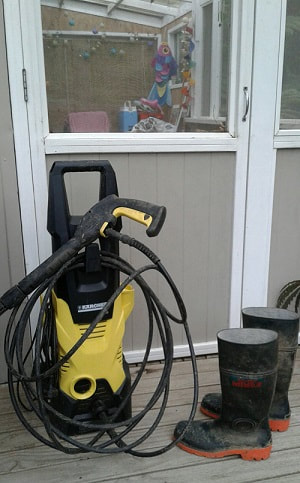 We are faced once again with the dogged determination of this COVID virus to insinuate itself into the fabric of our lives with the stealth of a stalking tiger. You cannot see it, or hear it, and yet here it is again to wreak it's havoc. I'm all in a dither. There is comfort in knowing I'm not the only one. However, as a friend of mine in Atlanta used to say, 'Chin up brave soldier'. We can do this. Yesterday was the first full day of Level Three restrictions in Auckland. Roadblocks, no leaving now. The rest of New Zealand is at Level Two. We are the chosen ones here in Auckland because we have had outbreaks, evidence of community transmission, the dreaded eventuality we have managed to avoid for over 100 days. And everyone says, 'But we have been doing so well!' What did you do yesterday on that first day of another lockdown? I was so dithered that I couldn't really focus on work so I decided to get outside (it was a beautiful day, reminiscent of the first day of the Level Four lockdown in March - calm, blue sky, bright sun) and do stuff. I sprayed 30 Seconds all over the outdoor stairs, of which I have many, then I got out the water blaster and made merry on the slippery paths and decking while Betsy cat watched from the safety of the bush. Today I will probably do more because 'doing' is far better than 'thinking' right now. I go into quite the Zen state when I have the water blaster out, back and forth with the wand, watching the dirt and slime fly away, and then admiring the fine work afterwards. And I'd like to add that I have a tank full of rainwater for this purpose because, to add to the woes of our city, we are in a drought situation with water restrictions in place for those on town supply. Doing chores gives me some control over something at a time when I feel as if I have none. It also takes my mind off things. It provides a respite from the relentless plague of uncertainty that surrounds us every waking minute: what will happen next, can we believe everything we're told, where will the next outbreak be, is that South Auckland cluster under control, the virus has hopped over the bridge and is now on the North Shore, it's getting closer to us, here on our peninsula, will it find it's way into our neighbourhood ... on and on it goes. I took a break and sat in the sun with my walking buddy Pam who lives over the road. We had a cup of tea in the garden and some of her delicious home made cookies (with dried cranberries). She was pretty subdued as well. We watched the family groups out on their bikes and scooters again (something we hadn't seen much of since we emerged from heavy levels last time), more people walking dogs again and I wondered if Ernie would return to the beach front with his stuffed-toy friends, to provide some lightness and fun in this grim situation. So I ask again - what did you do on the first day of Level Three in Auckland? Did you happen to look in the mirror? I did. After my water blasting, I went in to wash my hands and happened to look up at myself reflected there. I saw a face spattered with odd bits of unmentionable rubbish - mud, grass, dead bugs maybe, not sure - but I also saw a face that looked vaguely startled, as if it had been taken by surprise by something that it knew was coming, but had always thought would not. 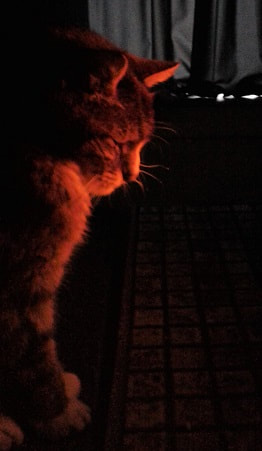 As writers we need quiet, contemplative time. When I was being mentored by writer Mrs M. at a very young age, she thought 'thinking time' was an indulgence, a luxury that could be ill afforded because it was all about producing, the writing, the quantity, the content. I cannot be too hard on Mrs M because she taught me some valuable lessons about writing process, self discipline, marketing, publishing, the tools of the writer's trade, and I remind myself that Mrs M. came from a journalistic background. She wrote for newspapers and she wrote a lot, all the time in fact, and she wrote to deadlines which didn't leave much time for that part about writers that can be hard to understand ... quiet contemplation, the time we spend thinking, imagining, not writing. My cat Betsy is very good at it. She is very old now, going on 21, and so spends a lot of her time just looking at things, sitting quietly, or lying down, and every evening during the winter, there is nothing she looks forward to more than the lighting of the wood burner. This is her most beloved time for contemplation. Around 4pm she takes her place before the cold wood burner and waits ... waits for the staff to come with the newspaper, the kindling, the basket of dry wood. She almost climbs inside the burner, such is her anticipation. Up flare the flames, swirling goes the smoke, and voila .. fire and heat. Delicious. It took me a while to realise Mrs M's stalwart 'produce!' attitude wasn't the best for me. I had to find the right balance between production and contemplative time. I needed freedom to think, to ponder, to mull things over, to look up and look down, to contemplate my life, the world around me ... and all of this would eventually distill down into writing, a concentrated dose of sweetness, or sadness, or joy, or darkness ... whatever it happened to be. It took some time before I could allow myself this meditative peace that is as essential to the creative process as the warmth of the fire is to Betsy-cat's old bones and happiness every evening. Every now and then I still get anxious about lack of 'output' and so I look to Betsy and her wise behaviour of just 'being', watching, sniffing, and I would add hearing to m,y list but not hers as Miss B is almost entirely deaf now. I, too, enjoy our fire time. We both stretch out in the heat, have our respective beverages (hers a small dish of milk, mine a shot of whisky), and share stories of the day. Purrfect. 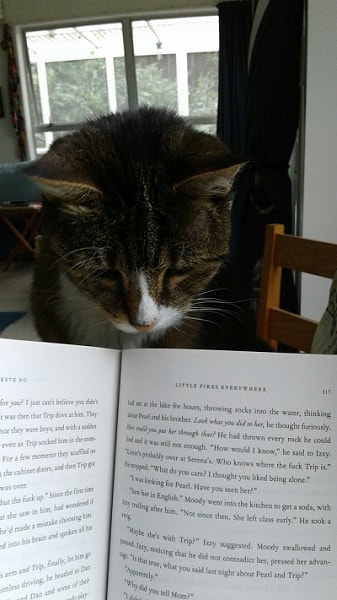 This wild winter weather has me inside more these days, catching up on my reading. Prior to the COVID-19 restrictions that locked us out of the libraries, I had ordered in several books that would have arrived in a well-spaced way, enabling me to read them in a leisurely fashion. But they all arrived at once and it was joyous seeing a pile of fabulous books stacked up on the table again, ready to be opened and enjoyed. It meant that I had to get reading quick-smart so on these cold mid-winter afternoons, Betsy-cat and I hunker down by the wood burner and get stuck in. Here she is desperate to have a read of Celeste Ng's Little Fires Everywhere but I was not keen to share. I read a well-known and much respected memoir, All Over but the Shoutin' by Rick Bragg. Published in 1977, this memoir about growing up poor in rural Alabama showcases Bragg's talent for storytelling which won him a Pulitzer in 1996 for feature writing. I am now heading into a recent biography of Janis Joplin by Holly George-Warren, simply titled Janis that takes us from her rebellious days in Port Arthur Texas to the fame that ended with an accidental heroin overdose at just 27. Next off the blocks will be Elizabeth Gilbert's latest City of Girls. One of the standouts for me though was a memoir by T. Kira Madden, Long Live the Tribe of Fatherless Girls. I loved this book and almost wanted to read it again as soon as I had finished it. Searing, truthful, written as a series of connected vignettes and snapshots, it captivated me as few memoirs have done in a long while. It's a somewhat brutal read and not always pleasant but I thought it was something special. I'l also mention two others I've enjoyed recently: In the Dream House by Carmen Maria Machado and The Yellow House by Sarah Broom. As I write this today the squally rain has come again driven by a violently powerful westerly wind that tosses the trees about in a mad dance. It's cold too. Perfect book-reading weather. I hope you have a good volume to settle in with now, or later today. Can't beat the journey of imagination, intrigue, information, and power that a wonderful well written book can offer. 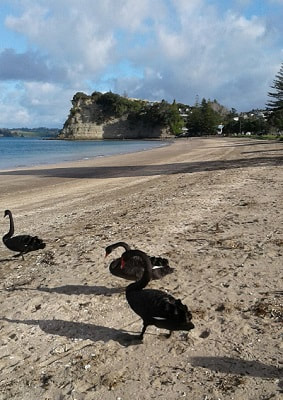 Just down the road from our beach there's a storm water pond that attracts a lot of bird life: ducks and pukekos, and a pair of swans who have produced several generations of babies, happily raising them in the relative safety of the pond. Every now and then Mom and Dad take the kids for a ramble. When the offspring are old enough and big enough to go the distance, they parade in an ordered row down to the beach for a swim in the salty sea. They were at the beach one afternoon last week so I stopped by to say hello as they fed on some fresh grass. Sometimes I've looked up from my computer here at home and seen them paddling across the bay, quite far out, in all weathers, the windier and wavier the better it seems as they forge along, undaunted. After I took this photo, the troupe wandered back down the beach and into the water to begin their trek homewards to the pond. They paddled parallel to the beach and waited in the wavelets until a little dog had passed by and it was safe to come out. Our local swans need a change of scene every now and then and so do we, especially these days after we've been cooped up by COVID for ages. Mom and Dad swan bring their offspring to the beach to experience something new, see a different scene, eat some better-tasting fresh grass, feel salt water on their feathers. As writers, we need to do all of these things too. Take yourself off to a new place, or revisit a favourite hang-out. Taste some new foods or drink a familiar ale and enjoy it fully. See some new sights, open up your nostrils to the scents of the world, spread your wings and feel the gentle spatter of rain on your feathers. Replenish the well that COVID has drained. Restore that creative spirit. It doesn't take a lot of money, or any at all if you like. It's a worthy investment in your imagination, your writing, your soul, and that's always worth its weight on gold. 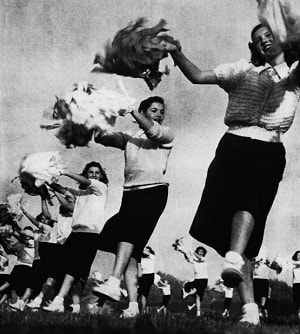 Well done all of us. We deserve a good cheer! We have made it to Level 1 with 0 new cases of COVID-19 in New Zealand (as of yesterday anyway - and hopefully today, tomorrow, and on and on ...). What an achievement, and with such good news comes some optimism, although we do have a ways to go to get the country back on its feet. Most everyone I speak to says they had some pretty grey days during the lock-down period, especially early on when we were restricted to home, going to the grocery store was more stressful than usual, and we could not meet with friends and family outside of our own bubbles. But there was plenty of writing going on. I recently shared one of my Isolation Journal posts with friend and fellow writer Deborah Shepard on her wonderful site where she has published writings from the lock-down written by a number of authors. Have a look. It's a great collection and so reflective of the myriad of feelings, experiences, ups and downs that were so much a part of this very strange period in our history. So far, our autumn and early winter weather has been less grisly than usual: fewer rainy, bleak days, far more sun and clear blue sky. It's chilly, but the brightness of sunshine really does make one feel better about it all. My lock-down walking buddy Pam and I still take our daily perambulations around the bay, sometimes dodging a few squally showers, but we're always out there, doing our thing. The daily walks and chats, and the good weather, are helping me get back into gear, revving up the writing engine. I have projects on the go, chipping away at the memoir about my Mom. My daily journaling helped to keep some of the more dismal thoughts at bay during the worst of our COVID-19 days, as it always does, and I can see threads of optimism weaving their way into my words. My new computer and I are getting along much better. We have settled into a relationship that is working for us and that is so important as for several days, I could not bear to even look at it, and so very little writing was done. A writer's tools must be right for the job at hand and this new member of the household gave me so much grief as we were transferring files over from the old machine, it took me days to settle down. So this morning it is bright and clear out there and as I have visitors this weekend, I'll get out into the garden soon to tidy up the front path, then I'll pick up all of Betsy's blankets from her many night-time sleeping places and give the whole place a good sweep up. The thought of all of this is so exciting (my new found optimism showing its colours), I'll probably write about it later, as even house cleaning can be a source of creative inspiration. 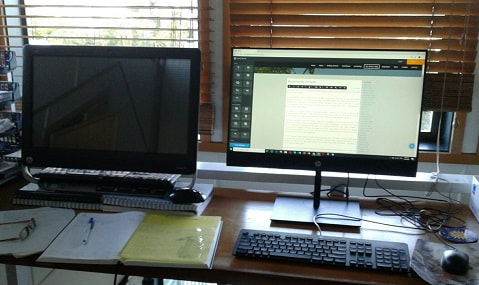 Pretty early on I started training myself to do my writing on the computer. My first computer was a Compaq which I just didn't know how to use at all. I'd never been taught during my schooldays and the whole thing was a complete mystery that ended fortuitously when I moved house and the person carrying the computer managed to drop a bunch of dirt into it. I wasn't upset because all I ever did was look at it, sitting there with its massive boxy monitor, displaying itself with confidence and arrogance. So I went out and bought another Compaq. I was able to master it by then as we were using computers all the time at work. Word became second nature, email was the way to go, and this whole new world of writing stuff and submitting it electronically was opening wide. I loved it all. There may have been another one or two and then came the HP Touchsmart with the big 28 inch screen that was fabulous to work on. You can see it sitting up there on the left in the photo. By now I was editing websites, designing newsletters, and many other things to earn a living and having the big screen was a cannot-go-back-from and so last Friday I decided to retire the old HP and get a new one: once again an HP with a big screen, much faster and whizzier than the old one because, as we all know, time is of the essence and the old girl was taking far too long to boot up each morning (I don't mean me). You can see the new one on the right, and on its screen is this very Blog that I am writing. A friend came by to help transfer all the files and get me set up. I am able to do some of this work myself but other parts of the process defeat me in a way that is terrible to witness apparently: plenty of hair pulling and screaming with rage and frustration, whisky bottles flying hither and thither ... my friend is still my friend, so that is good. Anyway we got into our work and the amount of security that had to be sorted before one could even get to first base with this sleek new number was truly astounding and even my tech-savvy friend who is known for calm composure in the heat of battle was showing visible cracks in the facade. My response, as usual, was to attempt to throw the offensive machine out the window where it would slide down over the roof and thunder into the street below with a spectacular finale. My friend reminded me that I had paid a 'pretty penny' for the thing and throwing it away would be counterproductive in so many ways. Fortunately, my old computer is still working, so we Googled and gobbled potato chips and gulped whisky and found the solution and the e-doors of the new machine banged open with frightening speed and efficiency. I have not bonded with the new machine as yet. It is too soon. It appears to me to be clever and silently ferocious, devastating in efficiency and somewhat unforgiving when I make a mistake but clever enough to sigh, shrug its shoulders and say, 'just give me a minute, you silly sausage, and I will fix myself.' So right now, new stands beside old in my office. It looks impressive, like the workspace belongs to a demon writer who churns out books with the speed of light. I am keeping old with new in case new kicks up rough again and decides it's had enough of dealing with my incompetence. Then I can just wheel my chair a little to the left and take up with my old HP Touchsmart mate again. As my friend said, 'Well, at least you can keep working. If you didn't have a computer, you couldn't work.' How true. 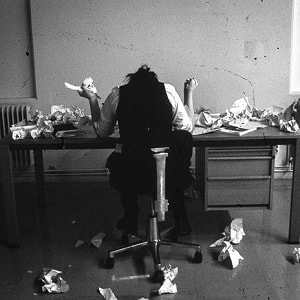 Many of us thought we'd get so much done during the COVID-19 lockdown. We'd take care of those niggling projects around the place that we'd put off for years, finally landscape the garden, have a big clean out, catch up on those books we've wanted to read, clean the house from top to bottom ... write the books we've been thinking about forever .. Well, we can't water-blast any more in Auckland because of the water restrictions; the libraries are mostly still closed (although some are opening now); and writing that book, well, don't feel badly if you only wrote a couple of pages or a few words, or just spent the time thinking about it. You're not alone. I had hopes too that I would get stuck into the book I'm writing but you know what? All I managed during the four+-week lockdown of Level 4 was my daily isolation journal. I've kept up my own personal journal though ... but I have to bribe myself to sit down in the late afternoon with a shot of whisky. Here we are in Level 2 with less restrictions but I still feel as if I'm in a creative slump. I cannot manage a single paragraph. I have learned over the years not to beat myself up if I cannot write. There's always a reason for the dimming or disappearance of the creative powers. It's been an anxious, difficult time these last couple of months. My mind has been preoccupied with so many different things, like that first trip to the grocery store during the early weeks of Level 4, not knowing what to expect and thinking the virus might leap out from behind the apples and up my nose, or it'd hitch a ride home on a bag of nuts. There have been financial worries too and when that happens, Creative Mind gets paralysed and cannot imagine or create anything and Manager Mind takes over as we search for money here there and everywhere, budget and ration, plan and scheme so we can stay afloat for another week. Ah the writing life! It's a delicious challenge (almost like a guilty secret) at the best of times and when an economic calamity befalls the country, one that is out of your control, it's a precarious situation. The 'not knowing' what the future brings is disorienting because we usually have some control and choice over that. Feeling disempowered, having decisions made for you (ones that you may not like too much), being told what you can and cannot do, all piles up to challenge those plans to clean and scrub and hammer and nail and write. But we are getting there. We have some time to go yet but we are making progress and that is cause for the no-more-than-ten people celebrations and behaving oneself in the bars whilst drinking beer. I haven't been out for beer yet. We're all a bit wary of this however I am working up to it because I need to fill up the well. Not with beer but with what a friend of mine calls 'input'. I have to get out and see things, talk to people, take those cautious steps back into life's mainstream, experience the colour, hub-bub, the noise, and stir up the sluggish imagination. Fill up the creative well.  I cannot say enough about personal writing at this time, sitting down and recording your experiences of the effect COVID-19 has had on your life. Think back to when you first heard about this virus, how the reality began to dawn on the world that this thing was going to spread all over the show, and then came the day we knew would inevitably arrive. The disease had arrived here. Remember the panic buying at supermarkets, everybody all over the place, no flour and no toilet paper, the pleas from government to take it easy, there is plenty for everyone ... I cannot remember anything comparable in my lifetime (I can say that now, being of a venerable age!) , although I do recall, parting the misty veils of time, a measles outbreak when I was at primary school. However, back then we did not have the protocols we have now, and so it was kind of a case of getting it and getting over it, rather like a 'herd immunity' situation, and indeed, everyone got it. That was the time I was so sick I had measles on the soles of my feet and in my high-fever daze, saw Jesus standing beside my bed. But that's another story. Like many others around the world, I kept an isolation journal during this strange COVID time and wrote daily about what life was like while we were 'locked away' here in New Zealand for five weeks. I haven't read back through those entries yet and probably won't for some time. Right now, I don't want to relive any of it because I am looking forward, not backward, with a fresh set of concerns and anticipations - and no shortage of anxieties too. However, for me using my journals as resources for future writing is a tried and true technique that I can recommend. There will come a day when you'll want to remember this time in world history and the part you played in it. And if you write about it now while it is fresh, immediate, in your face, you'll have that raw material at your fingertips. So do it. Get writing. There's no time like now to get started on a personal memoir or journal and if you need a kick start, I can give it to you in a take-no-prisoners 40 minute California-or-bust no-excuses online session for just $21. Please give it a go. Let's Zoom together.  Some of the most powerful memoirs are those written within the context of the 'big picture.' By that I mean, a writer tells the story of a life lived within the context of history. Many people have written memoirs about the world wars and their experiences fighting in these global conflicts, or as civilians trying to survive. Others wrote about living through the Great Depression, the great stock market crash, or what it was like to exist within the walls of Auschwitz. Such memoirs are often about loss: loss of freedom, loss of financial stability and a way of life, the loss of a limb or other body part, the loss of emotional, physical, or mental health due to witnessed or experienced trauma, the loss of loved ones. They are also about living through these losses: how did the writer do it? What steps did they take to get over the trauma or challenge? What can I as a reader take away from this memoir? We are now going through an historic event as the worldwide pandemic of Covid-19 sweeps through populations with devastating outcomes. While there are common denominators, each of us is having a different experience, different thoughts, varying viewpoints. My story will not be the same as yours. We are all individuals. That is what will make your story unique. A crucial aspect of memoir is self awareness and self understanding, looking at how we, as individuals, respond to life and events around us. To understand the loss we have to explore what life was like before Covid-19 entered centre stage. Sure, our lives were probably not perfect but what were our concerns, what were we doing, what was life like before 'the change' came, the catalyst (the virus) that turned our world upside down? Set the stage, raise the curtain, let the action begin. Right now we are living through it. The challenge is the virus. The loss is the suspension of freedoms, losing incomes and the way of life to which we are accustomed, and, heaven forbid, the loss of people we know and love. There's no telling how long the virus will affect our lives but one thing's for sure. It's something we won't forget, and it is an experience that will change our lives in many ways. If you want to get started with some writing and need some help, contact me, let's get online and talk it through. There's never been a better time.  I was writing in my journal yesterday afternoon and when I read back over what I'd written, the two words 'I hope ...' kept coming up. There was, 'I hope we all get through this' and there was 'I hope my neighbours over the road will be OK' and then there was, 'I hope this ends soon.' Plenty of hoping going on - and that's about all we can do during such times of uncertainty. We do know plenty for sure: that New Zealand will progress to Level Four as we move to control the spread of the Covid-19 Coronavirus here. This means we all stay home. We can go out to the supermarket to gather essential supplies, and of course seek medical help if we need it. We can go walking but not with other people unless they are two metres away from us. That'll be interesting. My friend across the street and I walk most days and I guess we'll have to shout at each other as we walk the beach. Matter of fact, a moment ago, I heard two women speaking loudly as they walked along - and there they were, separated by a good two metres. Well done ladies. I didn't sleep well last night. There was some heavy rain but that wasn't the problem. I had dreams about people leaving and I dreamt about my Mom. She died in 2010 but still enters my dreams now and then. Last night, she was old and disabled, as she was about a year before she died, frail and small. I was holding her up and she seemed to sag in my arms, and I said, 'Are you going to faint?' I asked and she said, 'Yes, I'm going away.' I know that such dreams are created by an anxious mind. I woke up with a feeling of such empty uncertainty. I firmly believe that there are few things harder to cope with than uncertainty, the 'not knowing' what will happen, having to 'wait and see'. I experienced alot of that after my first diagnosis of breast cancer: waiting for treatment, waiting for results, not knowing at the time how those results would impact my life but knowing with a pit-of-the-stomach certainty that they would. And that's kinda how it is now. We just don't know alot. We've seen what's happened overseas and we wonder if that will happen here and we are told that it could. We have to trust our country's leadership and most reckon Ms Ardern our PM is doing a good job. So once again, I say, 'write about how you're feeling'. Keep a daily journal as we move through these strange and unsettling times. Write about how you are coping, what you are doing with the time you have at home, what new things you're exploring, and when you do speak with family and friends, write about how they are feeling, what they are saying. And remember the hope thing. As humans we are hard-wired for it and this instinctive belief in hope won't let us down. 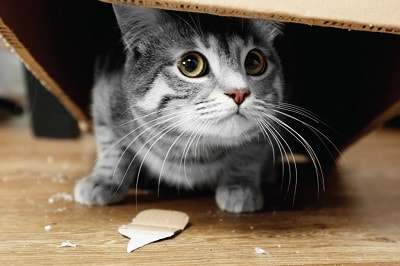 I don't know about you but all of the coronavirus news has made me more than a little anxious. Makes me want to hide under a box. It's something I've never had to deal with in my lifetime and despite all of the information flooding our way, we all have to make our own decisions and figure out how we'll navigate through the coming months. As for Betsy-cat, she's worried about her supply of Fancy Feast cat food. Will the shops run out? For us, it's all about toilet paper and bread. The early bird still seems able to catch the worm and people are getting up to the supermarket early to get what they need. Watching scenes of panic buying inspires feelings of anxiety too: will there be something for me when I need it? I was talking to a neighbour about the toilet paper crisis and he could remember the outdoor dunny of his childhood with the day's newspaper tacked up inside because they didn't have toilet paper. I suppose one could always use one's journal pages if need be. During times of challenge, trial, worry, and stress, it can help to write about it. There's something about getting those worries down on paper that can make us feel better, lower the panic levels just a bit to where our blood pressure settles down and the stress headache dissipates. All that aside, writing about this virus crisis and what it is doing to our world and the globe can be good for you; write down your fears, see them on paper. In the writing, you may figure out solutions to those things that worry you most. I can help you get started with my 40-minute online journaling session. We'll talk about the benefits of journaling and how the daily practice can really help during this tough time. You can also look at my daily prompts - some of these might resonate with you and help get some writing started. There is no way of knowing how long this virus will affect our daily lives. It's likely to be months. We have to settle in for the long-haul and decide on some plans of actions and strategies. Let daily journaling be an effective plan of action to support your emotional health and well being. |
Archives
January 2024
|
